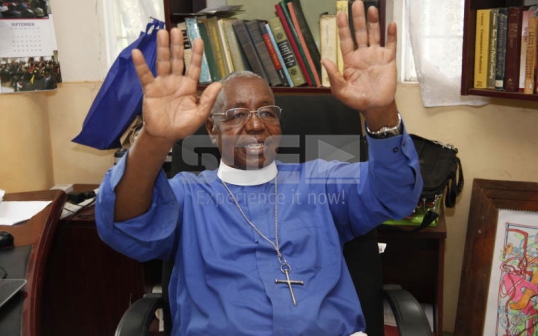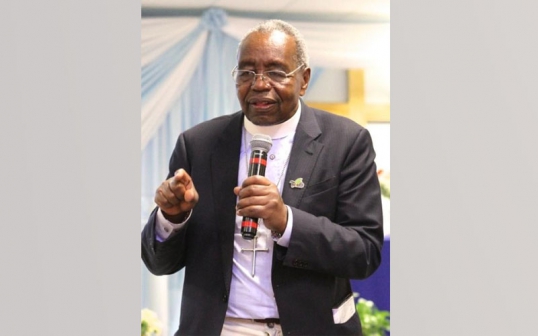
By talking about his mother’s clitoris, the Reverend Timothy Njoya touched a raw nerve, creating an uproar of near biblical proportions.
Njoya has been writing a book, not on church issues or political revolutions for which he’s known, but on sexuality, specifically, the clitoris.
The celebrated man of God told set the record straight, explaining to The Nairobian that “The book is not about clitoris but the divinity of the clitoris,” which he elaborates “is the second most wired part of the body after the brain.
I can tell you that some clitorises are more wired than some brains you see around,” says the Presbyterian Church of East Africa retired cleric and a respected human rights advocate adding that, “the clitoris conveys dignity, humanity and freedom of a human being.”
Dressed in his priestly collar, Njoya recalled that he had not expected the overwhelming reaction from Kenyans when he tweeted about his press book, The Divinity of the Clitoris, just when Kenyans were preoccupied with the August elections.
Many wondered why a man of the cloth chose the unspoken subject.
Some Kenyans on Twitter stoked the embers, spending valuable time educating Njoya on how not to ‘touch’ the clitoris.
But Njoya maintains that this is a noble cause since “the Presbyterian Church stood for clitoris in 1920s. In fact, my church has a memorandum on the clitoris. I can tell you for a fact that PCEA is very happy,” he says with a smile of assurance, adding that “God created the human being in totality, not in parts.
If God loved his creation, he loved the body as a whole, the clitoris included. If God’s creation was good, how then can the clitoris be bad?”
There was a fierce campaign against female circumcision and which divided Central Kenya in the 1920s when some adherents formed their own independent churches that supported the practice.
Njoya thus sees nothing wrong or degrading in writing about the clitoris. “I get calls from far and wide. International media too have been knocking on my door. One thing I can tell you is that the book is ready,” he says, referring to calls from the media in China, America and India.
Considering that Njoya earned his PhD from Princeton Theological Seminary when President Uhuru Kenyatta was 10 and a Doctor of Divinity from Knox College, University of Toronto in 1998, why would he settle on the clitoris and not any other subject?

“The clitoris works with ovaries and other human body organs to create human beings. They must be cared for like a child. Damaging the clitoris is reminiscent to destroying the child,” he says.
The Missionary Alliance had banned clitoridectomy in 1913 and 1918, but the African converts ignored the ban until Njoya’s mother came calling.
In a past article ‘A woman’s clitoris should be where God put it” written to The Nairobian, Rev Njoya reminded his readers that his mother, Wandia, was among the first Kikuyu women to escape circumcision on January 5, 1925 when she “mutinied against her scheduled circumcision ceremony and triggered the Kikuyu mass rebellion which sunk the British Empire.”
Cutting the clitoris turned girls into family property worthy of goats, cattle and liquor at the bride price market before they became wives and mothers.
But at the time, “it was taboo for girls to reach menstruation, have sex or get married without circumcision, but Wandia, led to the Tumutumu Church of Scotland mission in search of asylum and education,” wrote Njoya, adding that his mother believed “in her selfhood as the essence of being human, free and sovereign, and for which God sacrificed Jesus Christ. Her selfhood began as a being itself, in itself and for itself: life sui generis. Her selfhood was therefore the fountainhead of truth, dignity and destiny.”
The Kikuyu people then practiced female circumcision, but Njoya’s mother did not let her culture block her path towards realising her selfhood.
“Instead of becoming a victim of Female Genital Mutilation (FGM), she risked her life to keep her clitoris where God fixed it as a symbol of the human likeness with God,” wrote Njoya, further elaborating that “Wandia inter-networked the divinity of her clitoris with the “resurrection of the body and the life everlasting (Apostles’ Creed)” and in so doing escaped ‘clitoricide’ (mass killing of the clitoris). In his article, Rev Njoya concluded that “girls are born human, not to become alternative girls.
In fact, the only alternative to FGM is to give circumcisers and mutilators constructive rehabilitation and better ways to make money. Don’t imprison them. They are victims of mkosa mila ni mtumwa.”
 The Standard Group Plc is a multi-media organization with investments in media
platforms spanning newspaper print
operations, television, radio broadcasting, digital and online services. The
Standard Group is recognized as a
leading multi-media house in Kenya with a key influence in matters of national and
international interest.
The Standard Group Plc is a multi-media organization with investments in media
platforms spanning newspaper print
operations, television, radio broadcasting, digital and online services. The
Standard Group is recognized as a
leading multi-media house in Kenya with a key influence in matters of national and
international interest.









